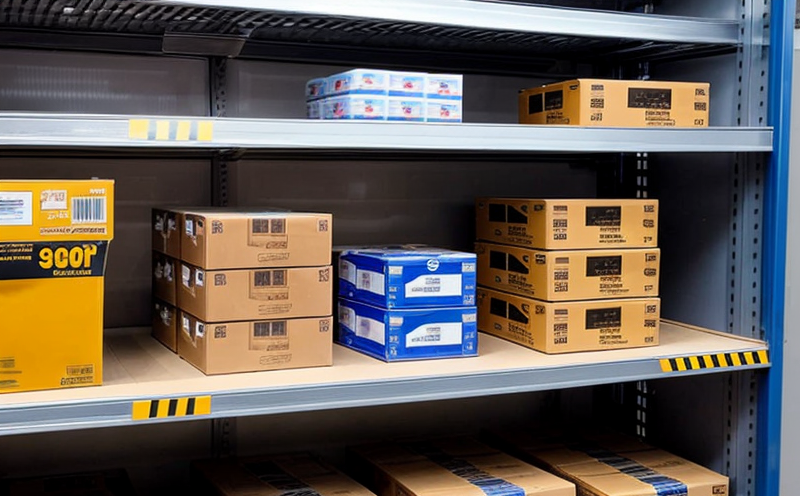ASTM D880 Impact Testing for Packaging Systems
ASTM D880 impact testing is a critical method used to assess the integrity and durability of packaging systems, particularly those intended for medical devices. This service ensures that the materials and designs selected for packaging are robust enough to withstand the rigors of transport, handling, and storage environments without compromising the integrity of the enclosed products.
The primary focus of ASTM D880 impact testing is to evaluate how well a package can protect its contents from impacts that could occur during shipping or in-use. This includes drops, vibrations, and other mechanical stresses that may cause damage if not properly mitigated by the packaging design. By conducting this type of testing, manufacturers can identify potential weaknesses early in the development process, ensuring compliance with regulatory standards and enhancing product safety.
The test involves placing a specimen (typically a small sample cut from the larger package) on an impact tester designed to simulate real-world conditions. The device then applies a controlled force or drop height to the sample, measuring its resistance against impact forces. Acceptance criteria are based on whether the sample remains intact after testing or if there is any visible damage that could indicate compromised integrity.
For medical devices, especially those requiring sterile packaging, maintaining airtight seals and preventing contamination during transit is paramount. ASTM D880 provides a standardized approach to verifying these properties through rigorous testing protocols. It helps manufacturers ensure their products meet both internal quality control standards as well as external regulatory requirements such as ISO 11607 for medical device packaging.
Understanding the nuances of ASTM D880 impact testing is essential not only for ensuring compliance with industry regulations but also for optimizing packaging designs to enhance protection while minimizing weight and cost. In today’s competitive market, where patient safety and product integrity are non-negotiables, accurate assessment tools like ASTM D880 play a crucial role in maintaining high standards throughout the supply chain.
Scope and Methodology
| Aspect | Description |
|---|---|
| Test Specimen Size | The size of the test specimen should be representative of a standard shipping unit, usually around 150 mm × 200 mm. |
| Impact Energy Levels | Tests are conducted using various impact energies ranging from 3 Joules to 10 Joules depending on the package type and contents. |
| Drop Height | The specimen is dropped vertically onto a rigid surface, with drop heights calibrated according to specified ASTM D880 guidelines. |
| Environmental Conditions | Testing often takes place under controlled environmental conditions such as temperature and humidity levels that mimic typical shipping environments. |
The testing process begins by selecting an appropriate specimen size, which should closely match the dimensions of a standard shipping unit. Specimens are then prepared according to ASTM D880 specifications, ensuring they accurately represent real-world packaging configurations. Following preparation, specimens are subjected to controlled impact forces via a drop tower setup, where they experience drops from predetermined heights onto rigid platforms.
Throughout the testing process, environmental factors such as temperature and humidity levels closely mimic expected shipping conditions to simulate realistic stress scenarios. This ensures that any observed failures or damages can be attributed directly to mechanical impacts rather than external influences like weather changes. After each test run, specimens are inspected visually for signs of damage or failure. Compliance with ASTM D880 standards depends on whether the specimen remains intact following impact without compromising its protective function.
Competitive Advantage and Market Impact
In an increasingly competitive market, ensuring that your medical device packaging meets stringent quality assurance criteria can give you a significant edge over competitors. By incorporating ASTM D880 impact testing into your development process early on, you demonstrate commitment to maintaining the highest levels of product integrity and patient safety.
Compliance with regulatory standards like ASTM D880 not only bolsters trust among consumers but also enhances brand reputation by showing that you adhere to best practices in packaging design. This can lead to increased market share as customers become more confident about purchasing products from brands they know follow strict guidelines for quality assurance.
Moreover, successful completion of ASTM D880 tests provides valuable data that informs continuous improvement efforts within your organization. You gain insights into which areas require further refinement or optimization, allowing you to stay ahead of emerging trends in packaging technology and design. This proactive approach helps maintain your competitive position even amidst changing market dynamics.
Use Cases and Application Examples
| Use Case | Description |
|---|---|
| New Product Introduction | Ensure that newly developed packaging meets all required standards before launching into production. |
| Material Selection Evaluation | Determine the most suitable materials for your product based on their performance under impact stress tests. |
| Process Improvement Initiatives | Identify potential weaknesses in existing packaging processes that could lead to reduced product integrity during transit. |
| Risk Management Strategies | Evaluate risks associated with different types of packaging and implement measures to mitigate these risks effectively. |
ASTM D880 impact testing finds application across various stages of product development and lifecycle management. For instance, during new product introductions, this test helps verify that the chosen packaging materials can withstand the necessary levels of impact without compromising protection for enclosed medical devices.
In material selection evaluations, manufacturers use ASTM D880 to assess different options’ suitability based on their performance under simulated transport conditions. This allows them to choose the most effective and reliable materials early in the design phase, optimizing both cost efficiency and quality assurance.
For process improvement initiatives, companies leverage ASTM D880 data to pinpoint vulnerabilities within existing packaging processes that might result in compromised integrity during shipment or handling. By addressing these issues proactively, organizations can enhance overall product safety while reducing operational costs associated with rework or returns.





